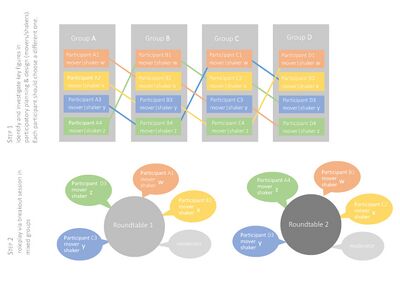Assignment 3: Role Play on Landscape Democracy "movers and shakers" (2018)
Jump to navigation
Jump to search
--> Back to Assignments Overview
Time frame
April 25 - May 9, 2018
Task description
- Each group will be asked to role-play and present the work/life/theories/beliefs of a designer or planner who has been active in promoting democratic work. In depicting the designer/planner, think of his/her personal background and history, the ethical challenges they have faced, the type of processes they engaged in, and who they worked with.
- Below you find a list of personalities we found relevant. You are invited to suggest different ones, based on your personal experience and knowledge.
- You may choose to represent their work either from their own personal perspective or through the perspective of the communities and places they worked on. The objective of this assignment is to make learning more active and to increase your awareness of the interconnectedness of knowledge, personal history, skills and attitudes needed to someone interested in landscape democracy and planning for democratic cities.
- You are invited to expand your personal experience by simulating a situation and presenting as if you were the practitioners you are researching. Try as much as possible to act out and have some fun in this process. This is why we will organise this role play without additional presentation materials.
Submission format and presentation
- Group work: Personalities and references will be introduced in the first session of phase B ‘Concepts of Participation' on April 25, 2018. The groups select their personalities and reflect on their value schemes, theories and approaches.
- The group prepares for the role play which will be organized in the form of ‘virtual roundtables’ on May 9, 2018
- You can conceive your role play around an imagined landscape democracy challenge, which you would discuss with your team of 'imagined designers'
- At the beginning of the play, please introduce 'yourself' (i.e. the designer you are playing) briefly and then conduct the discussion in the team. In total, this can be 20 minutes. After the play, we will discuss/reflect for another 10 minutes.
Evaluation criteria
- Relevance and comprehensiveness of aspects derived from the analysis
- Quality of oral presentation (i.e. keeping time limits, clarity)
Suggested list of landscape democracy 'movers and shakers'
- Randy Hester (UC Berkeley, Manteo, Big Wild, The Spoonbill project)
- Lawrence (Larry) Halprin, (The RSVP cycle, Levi’s Plaza and Headquarters)
- Karl Linn (UC Berkeley, Community Gardens)
- Mark Francis (Village homes)
- Anne Spirn (Mill Creek Project)
- Ken Reardon (University of Memphis, the East Saint Louis Project)
- Jan Gehl (‘Life between buildings’, how to study public life)
- Henry Sanoff (Planning Games)...Asif Adnan
- Ralph Erskine (Byker Redevelopment)
- Jeff Hou (Insurgent Urbanism, International district in Seattle)
- Walter Hood (UC Berkeley, Lafayette Park Oakland, CA)
- Samuel Mockbee (The Rural Studio)
- James Rojas (place-it)
- ReBar (Parking day/parklets)
- Giancarlo De Carlo (Team 10, Legitimizing architecture)
- Paula Horrigan (Cornell University; Rust to Green project)...Nawar H.Sabeeleish
- Christopher Alexander (The Oregon Experiment, Pattern Language)
- Julian Petrin et al., Hamburg (nexthamburg, German only)
- Leonie Sandercock (University of British Columbia, Collingwood Neighbourhood House)
- Klaus Overmeyer (Urban Catalyst Studio)
- Robert Jungk (Zukunftswerkstatt)
- Cecily Corti (Vinzi Rast mittendrin)
- Plansinn.at
- Sonja Hörster http://www.partizipativ-gestalten.de (Germany)
- Dominika Tihanyi (Budapest)
- Monika Arzberger http://www.koine.de (Germany)
- Alessandra Orofino
